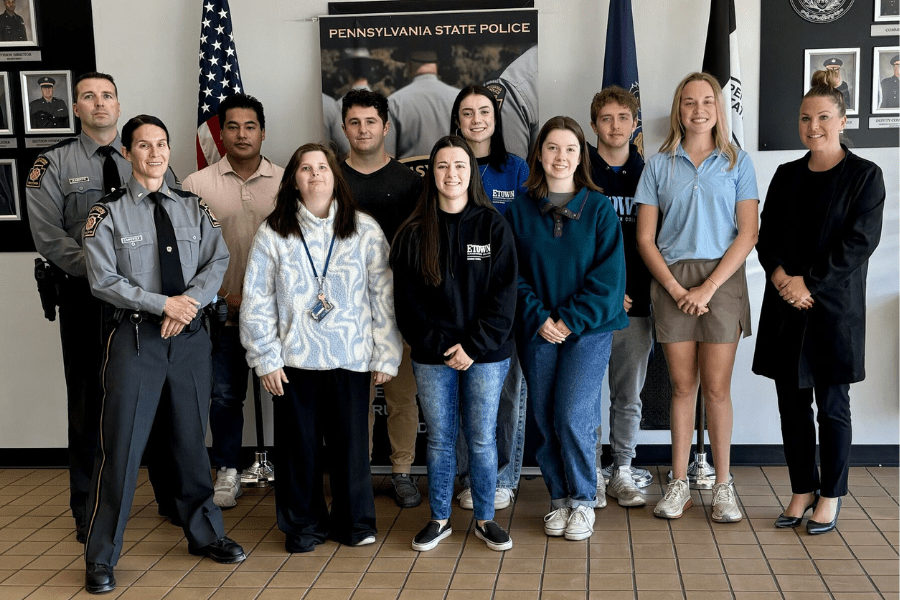Elizabethtown College’s Criminal Justice program recently concluded a semester full of experiential learning opportunities for its students, providing them with a range of opportunities to learn from experts in the field.
“Experiential learning opportunities are incredibly beneficial for Etown Criminal Justice students because they provide hands-on experience that allows students to apply classroom knowledge in real-world settings,” Elizabethtown College Director of the Criminal Justice Program Kadee Crandall said. “Our students are dedicating their time to learning and growth and exploring new experiences that help broaden their perspectives.”
Etown’s Criminal Justice Club was involved in several experiences. The club is a student-led organization dedicated to providing valuable learning opportunities to students who have an interest in criminal justice.
Various on- and off-campus experiences occurred throughout the Fall 2024 semester.

Members of the Criminal Justice Club at the State Correctional Institution in Camp Hill, Pa.
State Correctional Institution (SCI) Visit in Camp Hill, Pa. – Oct. 31
The Criminal Justice Club toured the Pennsylvania Department of Corrections’ Camp Hill facility, which is the classification center for all male inmates entering the state prison system. The club learned about the classification process and how incarcerated individuals can earn their GED and get certifications in other skills.
“The visit to SCI Camp Hill was one of the most incredible and informational trips I have been on,” Criminal Justice major Alexis Cooper ’25 said. “One notable thing I learned from this experience is that despite meeting individuals who have committed serious criminal acts, people are not defined by their charges.”
In addition to a tour of parts of the facility, SCI Camp Hill staff shared their insights into the state prison system with the Etown group.
Hershey Pennsylvania State Police Academy Visit – Nov. 5
The Criminal Justice Club also toured the Pennsylvania State Police Academy in Hershey. During the tour, officers shared what it’s like to be a cadet in the academy, including classroom material, physical fitness, along with housing and meals.
The experience helped Etown students to have an intricate view of what it takes to be a state trooper and prepare for a future career with the state police.
James E. Anderson Pennsylvania Conference on Juvenile Justice – Nov. 7
A group of Blue Jays attended the second day of the 2024 James E. Anderson Pennsylvania Conference on Juvenile Justice at the Hilton Hotel in Harrisburg. This year’s theme was “Maximizing Impact, Minimizing Footprint: Success Strategies,” and was attended by more than 900 people, including juvenile court judges and hearing officers, juvenile defenders, juvenile probation officers, and individuals formerly involved in the juvenile justice system.
Etown students experienced meaningful dialogue surrounding the past, present, and future of the criminal justice system, as well as participated in discussions with professionals dedicated to advancing reform and understanding of the system.
The group was welcomed by Scott Weller, the Director of the Center for Juvenile Justice Training and Research in the Juvenile Court Judges’ Commission.
Lancaster County Prison Visit – Oct. 16
A group of students enrolled in Elizabethtown College Adjunct Professor Terri Miller-Landon’s Corrections in America course took a tour of the Lancaster County Prison in October. Miller serves as the Deputy Director of Administrative Services with Lancaster County Adult Probation and Parole Services, a position she’s held for 12 years.
Prior to the tour, students learned about the two systems of jails built during the 1800s in the state. They used the knowledge to compare how the Lancaster facility compared to historical jails.
Students also had the opportunity to hear from the Lancaster County Prison Warden Cheryl Steberger on the plans for constructing a new jail in the next three years and how the planning process reflects the changing criminal justice system.
Cumberland County Forensics Lab Visit – Nov. 22
The Criminal Justice Club traveled to the Cumberland County Forensics lab, where they met with professionals across various forensic fields and got a tour of the expansive facility.
The group was able to see how the lab processes crime scenes and how they collect evidence while also visiting departments such as toxicology, digital forensics, and evidence intake.

